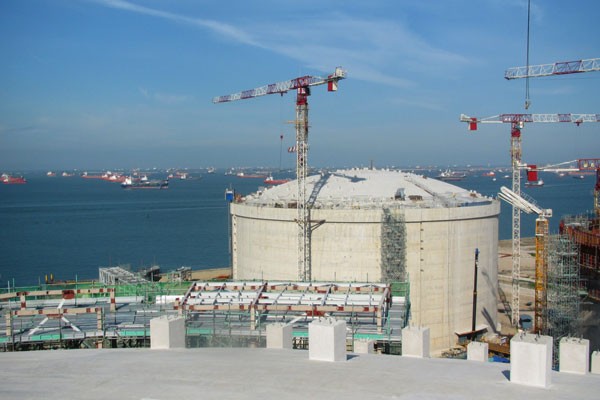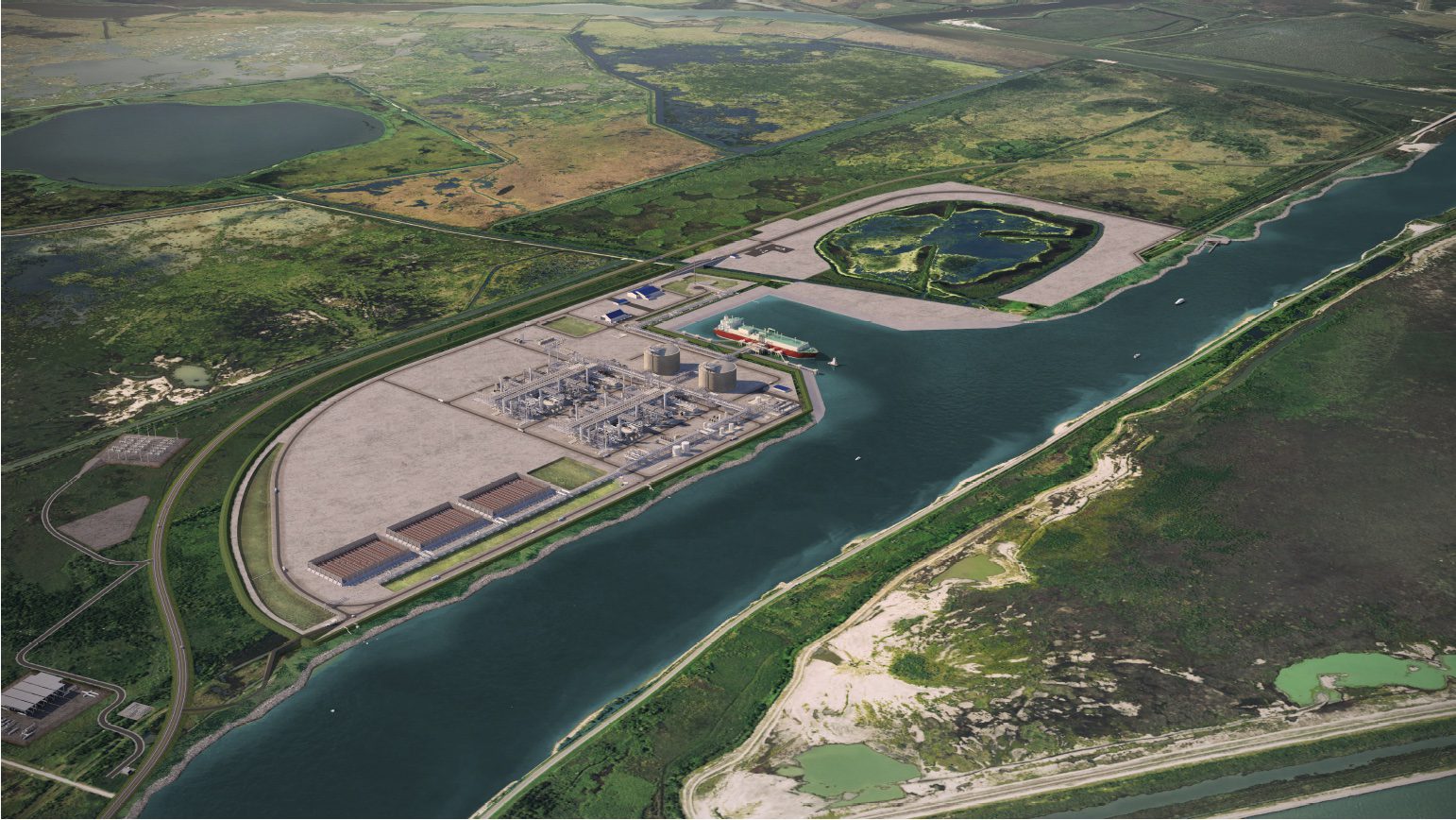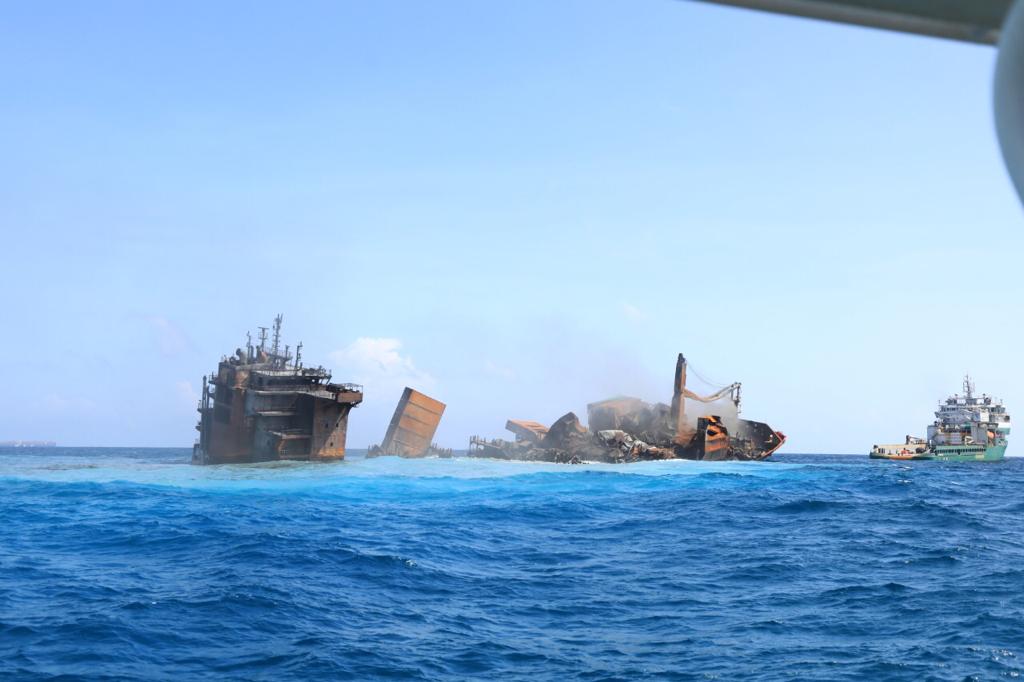View of Singapore LNG’s tanks under construction, Image courtesy of Singapore LNG Corporation
Oct. 30 (Bloomberg) — Singapore, which took delivery of its first liquefied natural gas cargo in March, plans to award new import licenses to as many as two suppliers as it seeks to establish itself as Asia’s trading hub for the fuel.
The city-state may buy an additional 1.5 million metric tons a year of LNG, according to Second Trade Minister S. Iswaran. That would be half the size of the sole contract it currently has with BG Group Plc. The Energy Market Authority, the industry regulator, will invite proposals and shortlist candidates next year, Iswaran said at a Singapore International Energy Week event today.
Singapore, Asia’s oil-trading center, is also vying to become a hub for LNG, supercooled gas shipped by tankers rather than pipelines. The region has overtaken Europe as the world’s biggest gas-importing region, accounting for 46 percent of global trade, according to the International Energy Agency. Regional gas demand is forecast to increase 3.9 percent a year through 2018, the Paris-based adviser said in June.
“The Energy Market Authority will probably start the process in the first quarter of next year,” Iswaran said today in Singapore. “Once the EMA has identified potential suppliers, then their engagement with the market will give us a sense of the size of sustainable demand.”
The nation of 5.4 million people opened its first LNG terminal in May with an initial annual capacity of 3.5 million tons, increasing to 6 million tons by the end of the year. The Jurong Island terminal will expand to handle 9 million tons by 2016 with the addition of a fourth tank. Natural gas supplied 84 percent of the country’s electricity in 2012, according to the Energy Market Authority.
Piped-Gas Moratorium
The government also plans to lift a moratorium on piped natural gas by 2018 or when BG, the exclusive LNG supplier to the Jurong Island terminal, reaches its 3 million-ton committment, according to Iswaran. This could lead to increased purchases from neighboring Malaysia or Indonesia, he said. As of August, the Reading, U.K.-based company had supplied almost 90 percent of its franchised volume, according to its website.
“We started off with LNG and we had a moratorium in order to ensure that the LNG market was able to develop and have a certain baseload position in Singapore,” Iswaran told reporters. “Going forward we should be able to open up our market to different sources of gas to ensure the most competitive sources are able to supply to Singapore.”
Purchases from Singapore’s neighbors may increase if the price of supplies is low enough to compete with LNG, he said.
Temasek Holdings Pte, Singapore’s state-owned investment company, set up Pavilion Energy Pte in April to tap growing demand for LNG. Pavilion has signed its first long-term deal with a European supplier, it said today.
Pavilion Energy
The company will receive 500,000 tons a year of LNG for 10 years starting in 2018, according to an e-mailed statement. The contract is with “a major European oil and gas multinational” for delivery into Singapore and the region, Chief Executive Seah Moon Ming said in a speech at the same event. Pavilion has also started trading the fuel and expects to complete its first cargo delivery to Asia by February, Seah said.
“Pavilion will be treated like any other commercial operator in the Singapore system,” Iswaran told reporters. “It’s a level playing field for commercial operation.”
Short-term, or spot LNG prices for Northeast Asia jumped to the highest level in almost eight months through Oct. 21 as buyers sought more cargoes to meet winter demand, according to Energy Intelligence Group.
Prices for the power-station fuel for delivery over four to eight weeks increased to $17.10 per million British thermal units, up from $16.80 a week earlier, the New York-based research company said on the website of its World Gas Intelligence publication.
– Ann Koh and Pratish Narayanan, Copyright 2013 Bloomberg.

 Join The Club
Join The Club











